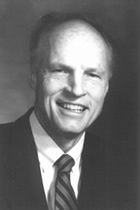
Yesterday I went to a...devtional? It wasn't really the normal BYU Tuesday devotional, but it was the same kind of setting. Regardless of the title you give it, Truman G. Madsen was the keynote speaker. I am a big fan. There is a question that I have wanted to ask him for years, ever since listening to his lectures on the Prophet Joseph Smith. I thought there would never be a better opportunity to ask, so I went up afterwards and asked. He was shaking hands of various students that had come up to meet him for one reason or another. He came to me, said hello, thank you, shook my hand, and looked like he was ready to move on, but I hadn't asked my question yet, so I just started before he could leave. I hadn't even gotten to the question yet when he stopped me, said "I know where you are going with this, I get that question all the time. I didn't realize it would be such an issue when I first spoke about that, but I now have a form letter to answer it. Give me your address and I'll send it to you."
However, Everybody else there was so intrugued as to what the question was that he just repeated it and gave the answer on the spot.
Here is the letter he sent me.
Dear Austin:
Thanks for your encouragement.
Here is the rest of the story.
THE WILLIAM HUNTINGTON INCIDENT
in Truman G. Madsen's, Joseph Smith, the Prophet, Bookcraft, 1989.
There was a beautiful moment when Dimick Huntington in a shoe shop was working on the Prophet's boots. The Prophet recounted things Dimick had done for him, mostly physical and comforting things—rowing the boat across the Mississippi until his hands were blistered, carrying messages, and as the scriptures have it, "hewing wood and drawing water." The Prophet expressed gratitude and finally said to Dimick, "Ask of me what you will, and it shall be given you, even if it be to the half of my kingdom." Dimick did not want to impoverish the Prophet. He asked something else. "Joseph," he said with his whole soul, "Joseph, I desire that where you and your father's house are [meaning in eternity] there I and my father's house may be also." The Prophet put his head down for a moment as if in meditation, and then looked up. "Dimick, in the name of Jesus Christ, it shall be even as you ask."3'
The father [should be brother as well as father] of Dimick was named William. One night the Prophet learned from Shadrack Roundy, who stood guard at his gate, that a mob was on the river. Shadrack Roundy's "rascal beater," which we would call a billy club, would not be enough against twenty men. The Prophet went down the street to William's house, woke him up, and said, "A mob is coming, counsel me." William said: "I know what to do. You climb in my bed. I'll go back and get in yours." That is what they did.
The mob came and dragged William out. Down by the river they discovered they had the wrong man. Their viciousness knew no bounds. In wrath, they "stripped him, roughed him up, tarred and feathered him, and herded him back into Nauvoo like a mad dog."32 When he finally staggered into his own home the Prophet embraced him and said with all the power of his soul, "Brother William, in the name of the Lord I promise you will never taste of death." That prophecy was fulfilled.33
p. 148 Notes and Sources to Chapter Three
32. "Brother Joseph," said William, "you were right to come. You get in my bed and don't you worry. The Lord will protect you." In the light of dawn the mob saw their mistake."When Brother Joseph saw what they had done [to William] he clasped him in his arms and said, 'Brother William, in the name of the Lord I promise you will never taste of death.' " (See Diary of Oliver B. Huntington, p. 9.)
33. William Huntington went west with the exodus and settled eventually in Springville, Utah. One night; forty-three years after the Nauvoo incident, just after going to bed he was conversing with his wife in the darkness. He said something and she replied. She said something and he did not reply. After two or three repetitions she lighted a lamp. Without a sigh or a shudder he had died. The family believed this was the fulfillment of Joseph's promise, which is universalized in the Doctrine and Covenants: "And it shall come to pass that those that die in me shall not taste of death, for it shall be sweet unto them; and they that die not in me, wo unto them, for their death is bitter" (D&C 42:46-47). See Diary of Oliver B. Huntington, vol. 2, p. 271, entry of March 19, 1887.





4 comments:
Why did you have to rub in the fact that you got to go to this and I didn't?
Was your question: Is William Huntington still alive, like unto the 3 Nephites?
my question was simply, Whats the rest of the story with William Huntington? I wasn't sure what to think of the statement he would not "taste of death".
The rest of the story is in his book as a footnote. He dies quietly with no pain years later in Utah at night while talking with his wife. So he never tastes the bitterness of death.
Post a Comment